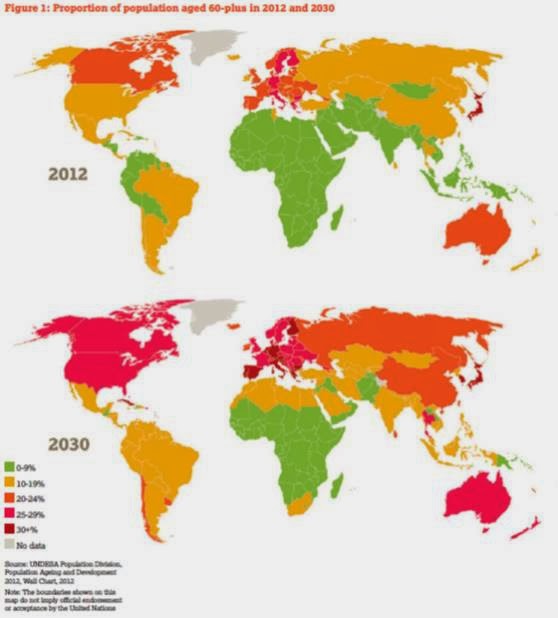This interesting map (drawn from UN population data) compares the proportion of the population in different countries that are and will be older people in 2012 and 2030. The proportion is rising almost everywhere. It comes from an interesting Global AgeWatch information briefing which says that governments and others are not collecting data about older people. They concentrate on younger people, so older people get missed out of the planning for policy and services.
Link to HelpAge download site, so that you can look at the briefing.
Thursday, 27 February 2014
Monday, 24 February 2014
Statistics on grandparent care
It’s always interesting to look through a pile of statistics.
The organisations Grandparents Plus and AgeUK dug through various reports on grandparents
providing childcare. Here are some highlights:
- The value of grandparental childcare in the UK in 2010/11 was £7.3 billion, up from £3.9 billion in 2004.
- In 2011, 28% of families where both parent work used grandparent childcare, 25% of lone parents, and 14% of non-working families.
- Nearly two thirds (63%) of all grandparents with grandchildren under 16 are providing some childcare, with one in five (19%) grandmothers providing at least 10 hours a week.
- Employment rates are lower for grandmothers than for women who are not grandmothers. While grandparents generally view providing childcare as a positive choice, there is some evidence of women giving up work to provide childcare.
- European data indicates that the grandmothers most likely to provide childcare are those who are younger, fit, healthy, and with young grandchildren.
The organisations say:
most informal childcare is provided by grandmothers aged 55 to 64 who are not working, because at the moment there are many more grandmothers in this group. However a significant minority of grandmothers are already combining work with childcare: and grandparents who are working are more likely to say they look after their grandchildren than those who are retired, reflecting the fact that working grandparents are generally younger and their grandchildren are also younger. As the proportion of working grandmothers increases, it will be of growing importance that they are able to combine work with supporting families through providing grandchild care, to avoid the emergence of a care gap.
Wednesday, 19 February 2014
Robot cleaners will lead to cuts in human contact in care homes and social care services
Which suggests to me that it will be a bit like having computers supplied to social workers over the last 20 years. Claims that it will lead to a reduction n paperwork proved to be nonsense. It just meant that the social workers had to do all the administrative work that was previously done by clerical workers. This led to extra stress for social workers and time taken from working with people and passed across to working with computers. It also led to cuts in the availability of routine clerical jobs for people with ordinary qualifications.
Robot cleaners will be the same. Once they're efficient and cheap, they will be used to cut routine staff from care homes, who provide a bit of extra humanity and human contact. And eventually they'll be handed out to older people in their own homes, so they will lose one of the little bits of human contact that they get from people doing their housework. And of course they'll also have to buy them or contribute to the cost, and won't have the alternative of opting for a human being, because that will be more expensive than a robot. And then, nobody will have a list of human cleaners, so the possibility will be lost anyway.
Link to the Guardian article.
Subscribe to:
Comments (Atom)


